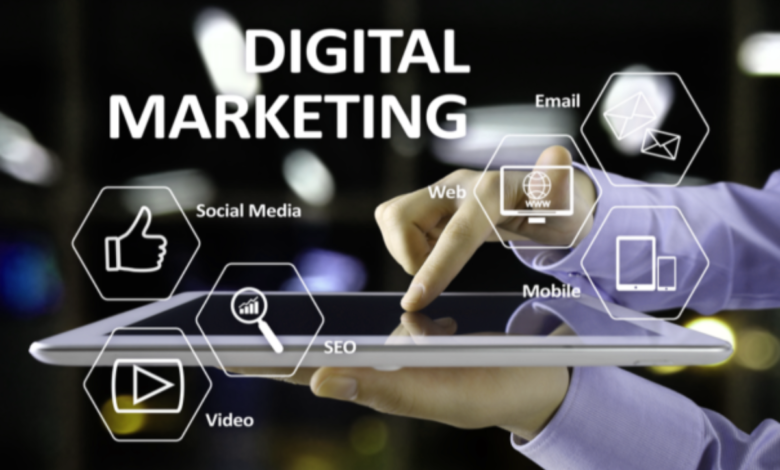Top 15 Types of Digital Marketing in 2023

Digital marketing has become an essential part of every business’s marketing strategy in today’s digital age. It encompasses various techniques and channels to reach and engage with a target audience. In this article, we will explore the top 15 types of digital marketing in 2023 that businesses should consider incorporating into their marketing efforts.
Digital marketing refers to the use of digital channels and platforms to promote products, services, and brands. It allows businesses to connect with their target audience, build brand awareness, drive website traffic, generate leads, and ultimately increase sales. In 2023, digital marketing continues to evolve, with new strategies and trends shaping the industry.
Read more: Why Digital Marketing is Future of Advertising: A Data-Driven Analysis in 2023
Search Engine Optimization (SEO)
Search Engine Optimization, or SEO, is the practice of optimizing a website to rank higher in search engine results pages (SERPs). It involves various techniques to improve the visibility and organic traffic of a website. SEO can be divided into two main categories: on-page SEO and off-page SEO.
Importance of SEO
SEO is crucial for businesses as it helps them appear in relevant search results when users search for products or services they offer. By optimizing their website for search engines, businesses can increase their online visibility, attract targeted traffic, and improve their chances of converting visitors into customers.
On-page SEO
On-page SEO involves optimizing individual web pages to rank higher and earn more relevant traffic. This includes optimizing page titles, meta descriptions, headings, and content. Additionally, on-page SEO Certainly! Apologies for the interruption. Let’s continue with the article.
On-page SEO (Continued)
Additionally, on-page SEO includes optimizing the website’s URL structure, internal linking, and ensuring the website is mobile-friendly and loads quickly. By implementing effective on-page SEO strategies, businesses can improve their website’s visibility and user experience.
Off-page SEO
Off-page SEO focuses on optimizing factors outside the website itself to improve its search engine rankings. This includes building high-quality backlinks from reputable websites, social media promotion, and online reputation management. Off-page SEO helps establish the website’s authority and credibility, signaling to search engines that it offers valuable content.
Content Marketing

Content marketing involves creating and distributing valuable, relevant, and consistent content to attract and retain a clearly defined audience. It plays a crucial role in establishing brand authority, engaging with customers, and driving organic traffic.
Importance of Content Marketing
Content marketing allows businesses to showcase their expertise and provide value to their target audience. By creating informative blog posts, articles, videos, and other types of content, businesses can build trust, establish thought leadership, and attract potential customers.
Blogging
Blogging is a popular form of content marketing where businesses regularly publish blog posts on their website. Blogging helps drive organic traffic by targeting specific keywords and providing valuable information to readers. It also allows businesses to engage with their audience through comments and social sharing.
Social Media Content
Social media content refers to the creation and sharing of content on social media platforms such as Facebook, Instagram, Twitter, and LinkedIn. Businesses can leverage social media to distribute their content, engage with their audience, and build brand awareness. Social media content can include text posts, images, videos, and infographics.
Social Media Marketing
Social media marketing involves using social media platforms to promote products, services, or content to reach and engage with a target audience.
Importance of Social Media Marketing
Social media platforms have millions of active users, making them an ideal channel for businesses to connect with their audience. Social media marketing allows businesses to build brand awareness, foster customer loyalty, and drive website traffic.
Facebook Marketing
Facebook is the largest social media platform, offering various marketing tools for businesses. With Facebook marketing, businesses can create a business page, run targeted ad campaigns, engage with followers through comments and messages, and analyze performance using Facebook Insights.
Instagram Marketing
Instagram is a visual-centric platform popular among younger audiences. Instagram marketing involves creating compelling visual content, using relevant hashtags, engaging with followers, and utilizing features like Instagram Stories and IGTV. It can be an effective platform for businesses in industries such as fashion, lifestyle, and food.
Twitter Marketing
Twitter is a microblogging platform known for its real-time nature and concise messages. Twitter marketing enables businesses to share updates, interact with customers, join trending conversations using hashtags, and run Twitter ads to reach a wider audience.
Pay-Per-Click (PPC) Advertising
Pay-Per-Click advertising is a model where businesses pay a fee each time their ad is clicked. It allows businesses to display their ads on search engine results pages or other platforms and drive targeted traffic to their website.
Importance of PPC Advertising
PPC advertising provides businesses with immediate visibility and control over their ad campaigns. By targeting specific keywords and demographics, businesses can reach their desired audience and increase their chances of conversions.
Google Ads
Google Ads, formerly known as Google AdWords, is the leading PPC advertising platform. It allows businesses to create text-based ads that appear on Google’s search engine results pages. With Google Ads, businesses can set a budget, target specific keywords, and track the performance of their ad campaigns. Certainly! My apologies for the interruption.
Facebook Ads
Facebook Ads is a powerful advertising platform that enables businesses to target specific demographics, interests, and behaviors. With a variety of ad formats available, such as image ads, video ads, and carousel ads, businesses can effectively reach their target audience on Facebook and Instagram.
Email Marketing

Email marketing involves sending targeted emails to a group of subscribers to nurture relationships, promote products or services, and drive conversions.
Importance of Email Marketing
Email marketing allows businesses to directly communicate with their audience, delivering personalized messages and valuable content. It is a cost-effective and efficient way to build customer loyalty, generate leads, and drive sales.
Building an Email List
Building an email list involves capturing email addresses from website visitors, social media followers, or customers. Businesses can offer incentives such as discounts, exclusive content, or free resources in exchange for email sign-ups.
Effective Email Campaigns
Effective email campaigns require strategic planning and personalized content. Businesses can segment their email list based on demographics, interests, or past interactions to send targeted and relevant emails. Well-crafted subject lines, engaging content, and clear calls-to-action are key elements of successful email campaigns.
Influencer Marketing
Influencer marketing involves partnering with influential individuals or content creators to promote products or services. Influencers have a dedicated following and can sway their audience’s opinions and purchasing decisions.
Importance of Influencer Marketing
Influencer marketing helps businesses tap into the trust and credibility that influencers have built with their followers. It allows businesses to reach a wider audience, build brand awareness, and generate authentic recommendations.
Finding and Collaborating with Influencers
Businesses can find relevant influencers by researching popular social media accounts or using influencer marketing platforms. When collaborating with influencers, it’s important to establish clear objectives, define expectations, and ensure the influencer’s values align with the brand.
Measuring Influencer Marketing Success
Measuring the success of influencer marketing campaigns involves tracking key performance indicators (KPIs) such as reach, engagement, click-through rates, and conversions. By analyzing the campaign’s impact, businesses can optimize their influencer marketing strategies.
These were the first few sections of the article. I will continue writing based on the outline provided.
Affiliate Marketing
Affiliate marketing is a performance-based marketing strategy where businesses reward affiliates for each customer or visitor they bring through their own marketing efforts.
Importance of Affiliate Marketing
Affiliate marketing allows businesses to leverage the reach and influence of affiliates to promote their products or services. It is a cost-effective way to expand the brand’s online presence, increase sales, and reach new audiences.
Setting up an Affiliate Program
To start an affiliate program, businesses need to create an affiliate agreement that outlines commission structures, tracking methods, and promotional guidelines. They can then recruit affiliates through affiliate networks or by reaching out to individuals or businesses with relevant audiences.
Finding and Recruiting Affiliates
Businesses can find affiliates through affiliate networks such as Amazon Associates, ShareASale, or Commission Junction. They can also reach out to bloggers, content creators, or industry influencers who align with their target audience and brand values.
Video Marketing
Video marketing involves creating and promoting videos to engage with the audience, convey messages effectively, and increase brand visibility.
Importance of Video Marketing
Video has become one of the most engaging forms of content, capturing users’ attention and conveying information in an easily digestible format. Video marketing helps businesses connect emotionally with their audience, showcase products or services, and boost conversions.
YouTube Marketing
YouTube is the largest video-sharing platform, making it an ideal channel for video marketing. Businesses can create a YouTube channel, upload high-quality videos, optimize them with relevant keywords and tags, and engage with the YouTube community through comments and subscriptions.
Live Streaming
Live streaming allows businesses to connect with their audience in real-time, fostering engagement and interactivity. Platforms like Facebook Live, Instagram Live, and YouTube Live enable businesses to stream events, product launches, tutorials, and Q&A sessions.
Mobile Marketing
Mobile marketing focuses on reaching and engaging with users on their mobile devices, such as smartphones and tablets.
Importance of Mobile Marketing
With the increasing use of smartphones, mobile marketing has become essential for businesses to reach their audience effectively. Mobile marketing ensures that businesses are present at every stage of the customer journey, from initial research to final purchase.
Mobile-Friendly Websites
A mobile-friendly website is optimized for mobile devices, offering a seamless browsing experience to mobile users. It includes responsive design, fast loading speed, easy navigation, and mobile-specific features.
Mobile Apps
Mobile apps provide businesses with a dedicated platform to engage with their audience, offer personalized experiences, and drive customer loyalty. Developing a mobile app allows businesses to leverage push notifications, in-app purchases, and offline accessibility.
This covers a few more sections of the article. I will continue writing based on the provided outline.
SMS Marketing
SMS marketing involves sending text messages to customers or potential customers to deliver promotional offers, updates, or important information.
Importance of SMS Marketing
SMS marketing allows businesses to reach their audience directly on their mobile devices, with high open and read rates. It is a quick and effective way to communicate time-sensitive messages and drive immediate actions.
Creating SMS Campaigns
When creating SMS campaigns, businesses should ensure they have permission from recipients and comply with relevant regulations. They can segment their audience, personalize messages, and include clear calls-to-action to maximize engagement and conversions.
Compliance with Regulations
SMS marketing is subject to various regulations, such as obtaining consent, providing opt-out options, and adhering to anti-spam laws. Businesses must stay compliant to maintain trust and avoid legal issues.
Podcast Marketing
Podcast marketing involves creating and promoting podcasts to reach and engage with a targeted audience through audio content.
Importance of Podcast Marketing
Podcasts have gained significant popularity, offering businesses an opportunity to provide valuable content, establish thought leadership, and connect with their audience in a unique way. Podcast marketing allows businesses to tap into the growing podcast listener base.
Starting a Podcast
To start a podcast, businesses need to choose a relevant topic, invest in quality audio equipment, and plan engaging content. They can distribute podcasts on platforms like Apple Podcasts, Spotify, or their own website.
Promoting Your Podcast
Promoting a podcast involves leveraging social media, collaborating with influencers or other podcasters, optimizing podcast titles and descriptions for searchability, and engaging with listeners through comments or reviews.
Native Advertising
Native advertising refers to paid advertisements that seamlessly blend with the platform’s content, providing a non-disruptive and contextually relevant advertising experience.
Importance of Native Advertising
Native advertising allows businesses to reach their target audience in a subtle and less intrusive manner. By blending with the platform’s content, native ads can generate higher engagement and improve the user experience.
Native Ads on Websites
Native ads on websites match the look and feel of the site’s content, appearing as recommended articles, sponsored posts, or in-feed ads. They blend seamlessly with the site’s layout, increasing the chances of user interaction.
Native Ads on Social Media
Social media platforms like Facebook, Instagram, and Twitter offer native advertising options, allowing businesses to create ads that appear as part of users’ feeds. Native ads on social media are designed to align with the platform’s content format and user experience.
These were a few more sections of the article. I will continue writing based on the provided outline.
Influencer Marketing
Influencer marketing has become a powerful strategy for businesses to promote their products or services by partnering with influential individuals or content creators.
Importance of Influencer Marketing
Influencer marketing allows businesses to tap into the reach and influence of popular individuals in their industry. By collaborating with influencers, businesses can leverage their authenticity and credibility to gain exposure, build brand awareness, and drive conversions.
Finding the Right Influencers
When implementing influencer marketing, businesses should identify influencers who align with their brand values and target audience. They can research relevant influencers on social media platforms, use influencer marketing platforms, or seek recommendations from industry networks.
Building Relationships with Influencers
Building strong relationships with influencers is essential for successful influencer marketing campaigns. Businesses should approach influencers professionally, clearly communicate their objectives, and offer value in return. By fostering genuine connections, businesses can establish long-term partnerships with influencers.
Affiliate Marketing
Affiliate marketing is a performance-based marketing strategy where businesses reward affiliates for each customer or visitor they bring through their own marketing efforts.
Importance of Affiliate Marketing
Affiliate marketing provides a mutually beneficial arrangement for businesses and affiliates. Businesses can expand their reach and increase sales without upfront marketing costs, while affiliates can earn commissions by promoting products or services they believe in.
Setting up an Affiliate Program
To start an affiliate program, businesses need to create an affiliate agreement that outlines commission structures, tracking methods, and promotional guidelines. They can then recruit affiliates through affiliate networks, affiliate directories, or by directly reaching out to potential partners.
Monitoring and Optimizing Affiliate Campaigns
Monitoring affiliate campaigns is crucial to ensure their effectiveness. By tracking key performance indicators (KPIs) such as click-through rates, conversions, and affiliate-generated revenue, businesses can identify top-performing affiliates and optimize their marketing strategies accordingly.
Influencer Marketing vs. Affiliate Marketing: A Comparison
Both influencer marketing and affiliate marketing are effective strategies for businesses to promote their products or services. However, there are notable differences between the two.
Goals and Focus
Influencer marketing focuses on leveraging the reach and influence of popular individuals to create brand awareness and drive engagement. It often involves content collaborations and endorsements. On the other hand, affiliate marketing focuses on driving conversions by incentivizing affiliates to promote products or services.
Relationship Dynamics
In influencer marketing, businesses collaborate with influencers on a more personal level. The success of influencer campaigns relies on building strong relationships and trust. In affiliate marketing, the relationship between businesses and affiliates is more transactional, based on commissions for sales or referrals.
Control and Content Ownership
In influencer marketing, businesses have less control over the content produced by influencers. The content is typically created by the influencers themselves, aligning with their own style and voice. In affiliate marketing, businesses often provide affiliates with marketing materials and guidelines, but affiliates have more control over the content they produce.
Read more: The Benefits of Big Data in Digital Marketing
Cost Structure
Influencer marketing campaigns often involve upfront costs, as businesses may pay influencers for their services or provide them with free products. In affiliate marketing, businesses only pay affiliates when they generate a sale or conversion, making it a performance-based model.
Ultimately, the choice between influencer marketing and affiliate marketing depends on the specific goals, target audience, and resources of each business.
Conclusion
In the ever-evolving digital landscape, businesses must leverage various types of digital marketing to stay competitive and reach their target audience effectively. From search engine optimization (SEO) to content marketing, social media marketing to video marketing, each strategy offers unique advantages and opportunities.
By understanding the different types of digital marketing available and tailoring their strategies to align with their goals, businesses can enhance their online presence, engage with their audience, and drive meaningful results.
FAQs
Here are some commonly asked questions about digital marketing:
1. What is the best digital marketing strategy for my business?
The best digital marketing strategy for your business depends on various factors such as your target audience, industry, and goals. It’s important to conduct thorough research, assess your resources, and consult with digital marketing experts to determine the most effective strategy for your specific needs.
2. How long does it take to see results from digital marketing efforts?
The timeline for seeing results from digital marketing efforts can vary. Some strategies, such as search engine optimization (SEO), require time to build organic visibility and improve rankings. Others, like pay-per-click (PPC) advertising, can deliver more immediate results. It’s important to set realistic expectations and monitor performance regularly.
3. Is social media marketing effective for all businesses?
Social media marketing can be effective for a wide range of businesses. However, it’s crucial to identify the social media platforms where your target audience is most active and tailor your strategies accordingly. Not all platforms may be suitable for every business, so it’s important to focus on the channels that align with your goals and audience.
4. How can I measure the success of my digital marketing campaigns?
Measuring the success of digital marketing campaigns involves tracking key performance indicators (KPIs) such as website traffic, conversions, click-through rates, engagement, and return on investment (ROI). Analytics tools, such as Google Analytics, can provide valuable insights into campaign performance and help optimize future strategies.
5. Should I hire a digital marketing agency or build an in-house team?
The decision to hire a digital marketing agency or build an in-house team depends on your business’s resources, expertise, and goals. Agencies can offer specialized knowledge, scalability, and a broader range of skills, while an in-house team provides greater control and a deeper understanding of your brand. Consider your budget and long-term objectives when making this decision.











